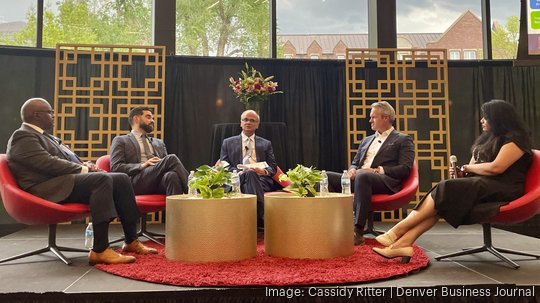
Several Denver city government departments have begun using artificial intelligence to automate and streamline work while speeding up response times to resident inquiries.
Thus far, use cases vary from a consumer-facing chatbot and data-gathering tool to a system that automatically generates reports for city staffers.
Other AI automation technology and use cases are being discussed, city officials said at a recent Voices of Experience panel put on by the University of Denver’s Daniels College of Business.
Al Gardner, executive director of the City and County of Denver’s Department of General Services, said he could see a future in which AI is used to ensure a contractor is doing what the city needs when it needs to be done. His department processes $2 billion to $3 billion worth of contracts each year, he said.
Another use case could be helping immigrants apply for asylum status, which must be granted to get work authorization, said Adeeb Khan, executive director of Denver Economic Development and Opportunity.
“For Denver, dealing with immigration and federal immigration law is not something that we have a lot of expertise [in],” Khan said. “... We don’t normally have inflows like we’ve seen in the last year with 40,000 individuals coming into Denver.”
Right now, asylum applications can take 20 to 40 hours to complete and often require one-on-one support, he said.
“AI is still very much an emergent technology,” Khan said. “The amount of use cases, I think, are actually very limited. ... But the mayor and his team and others are looking at AI solutions that exist right now that are able to help individuals.”
As potential use cases are evaluated, it’s important that the city uses AI in a responsible manner and ensures that the tools are human-centric, said Suma Nallapati, chief information officer for the City and County of Denver.
“Algorithmic transparency is critical,” Nallapati said. “Making sure those large language models do not have built-in biases, ethical considerations, all of these are very, very critical when you’re building the policy around generative AI."
Denver is using "very extensive policies" based on a framework developed by the federal National Institute of Standards and Technology and on what's been done by other cities "that are already emerging as leaders in this space,” she said.
Nallapati said it’s important that AI tools learn internally — rather than gathering information from the internet — and that humans remain in charge of the technology.
It's good when AI can handle mundane and “soul-sucking” tasks, because it allows employees to focus on “the true values and help the most vulnerable populations that need services,” Nallapati said.
While the city and county consider other opportunities to use AI, here are some ways Denver is currently using AI.
Sunny Chatbot
An AI-powered chatbot named Sunny helps residents report a problem, find resources and learn about nearby events, parking permits and trash pickup schedules. The 24/7 virtual assistant is available on the city’s website or by texting “hello” to HEY311.
Sunny is designed to provide general information but can offer personalized responses based on a user’s questions, according to the city’s website.
“Sunny’s capabilities are regularly updated based on user interactions and feedback,” the city's website says. “This ensures that it remains a reliable and efficient resource for accessing city services in Denver.”
Before the chatbot went live in February, residents could be on hold for up to 15 minutes; now, they can get answers within three minutes, according to the city.
The chatbot’s automation capabilities also mean the city doesn’t have to hire staff for the 311 call center 24/7.
eCycle Coupon
Automation of the eCycle Coupon launched in January to speed up the approval and delivery of electronic recycling coupons. The coupons allow Denver residents to recycle televisions, monitors and other electronics at a discount.
Before eCycle, the city took up to two weeks to verify a resident’s address and then mail the coupon to them. Now, there’s a 12- to 24-hour turnaround time with submissions approved or denied automatically. If approved, the coupon is emailed to the resident.
The city estimates this automation has saved 545 employee hours and $28,260 as of May 1, including cost-savings associated with mailing coupons to residents.
Human services information
The city began using AI-enabled automation in January to help Denver Human Services quickly gather caller information from state records for use in a city application without logging into several systems and databases.
Before the automation rolled out, staff would spend about five minutes trying to find information. Now, that same information is instant and updated as the state’s data is updated.
Inspection reminders
Denver's Department of Excise and Licenses automated inspection reminders and schedules to inspectors in January.
Before the new system, inspectors would have to come into the office and run a report before hitting the road and visiting properties. This process required about three hours of in-office information gathering.
Now, reports are generated overnight and available at the beginning of an inspector’s day, allowing them to go directly to the properties on their list.









